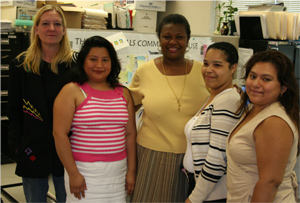By Maurice Pinzon
In his speech earlier this month in Washington D. C. on homelessness, Mayor Michael R. Bloomberg indicated that homelessness prevention was critical in reversing what the mayor called the failed homeless policies of the past. And keeping families in their homes is just what six women in a small unassuming office do every day of the workweek.
Marisol Moore supervises four “housing specialists”, and a receptionist who does double duty as a traffic cop screening families as they walk into the Forest Hills Community House’s (FHCH) Homeless Prevention Unit office. The office operates in space provided by New York City’s Human Resources Administration (HRA) in Jamaica, Queens. The FHCH is a non-profit multi-service social service organization in Queens that runs the program.
HRA case mangers working in the very same building have their own Homeless Diversion Unit. But often after they determine that a family is in imminent danger of homelessness they refer them to the Homeless Prevention Unit run by the FHCH.
In his Washington speech, Mayor Bloomberg touted a year old program developed by the city called “HomeBase”. The program seeks to prevent homelessness by targeting families, before they get to an HRA center, “in high-need communities”. There are six such HomeBase locations around the city, including one in Jamaica. The mayor announced plans to expand the HomeBase program.
In his speech Mayor Bloomberg said that with fewer families in the shelter system the city has an opportunity to place greater emphasis on preventing homelessness rather than counting how many more shelter beds the city has available each year.
Nevertheless, families are still falling through the cracks of poverty. In Queens these families often rush into the FHCH Eviction Prevention office in a panic with children in tow. Usually the first person they see is Jenny Gonzalez, who asks them a few questions and tries to calm them down as best she can. She’s been working at the job for six years. Almost every employee at the FHCH has been working to keep families in their homes for at least at decade and as a result have become experts at advocating on behalf of families with judges, landlords, government agencies and other organizations. This often includes working with Catholic Charities and Jamaica Homebase.
Ms. Moore said, “Everybody that comes here we help them, either we relocate [them] to a new apartment or stop the eviction.” She estimated [that] the program’s success rate at about 95%, even as the office has seen an increase in cases where a City Marshal has issued a notice of eviction.
Ellen Brenes, a housing specialist at the unit, added, “We’ve actually gotten cases where they got locked out and we got them put back in.”
The office is strategically located just a couple of blocks from Housing Court in Jamaica, where judges and advocates often refer families facing eviction to the Eviction Unit. Ms. Brenes said one judge who sees a homeless family in front of her facing eviction will often say, “go see the blonde bomber,” meaning Ms. Brenes.
Ms. Brenes is well known in housing court by both judges and advocates. When she negotiates with landlords on behalf of families, Ms. Brenes said sometimes she is able to get the landlord to agree to lower the rent so it is within a family’s budget. Ms. Brenes pointed out that usually landlords who own 2 or 3 family houses are more apt to agree than landlords of rent stabilized apartments.
Elizabeth Salgado is another housing specialist in the program. She said sometimes families are near homeless because of HRA sanctions on families where the head of the household is not participating in the required work program for people receiving temporary public assistance.
Ms. Salgado explained: “Maybe they don’t want to comply or don’t have a baby sitter.” But what she does is tell them, “You’re here, I’m going to help you, but this is what you have to do.”
“I’m not here to judge you, I’m here to help you,” she added.
When asked by this reporter why all the workers have stayed at an apparently stressful job for so long, all point to the satisfaction of the results.
Nirva Decopain, a housing specialist said: “It brings this thing out in my heart to know that that person is not going to be sleeping in a shelter room or that person is not going to be laying somewhere in somebody’s hard floor with children.”
Ms. Salgado said, “My satisfaction in working in EPU, eviction prevention unit, is when I see a family having a home and not being homeless.” Her job is clear-cut. “What I do is stop eviction,” she added.
Ms. Moore also had a reason for staying on the job: “I like to prevent eviction, I like to help, and I like to see the results. I like to see a home intact.”
Ms. Brenes said she had once faced eviction herself after her husband left her and forced her out of her job. In the process of getting her life back together she found out about the EPU program and started off as a receptionist. She worked her way up to become a caseworker.
“It’s an emotional job, you have to love what to do. You have to service people. If you don’t like to service people this isn’t the job for you.” Ms. Brenes added.
Mayor Bloomberg, in his speech, at one point said: “To rid our society of homelessness, we must first liberate ourselves from the chains of conventional wisdom, from the fetters of political correctness, from the tyranny of the advocates and their unwillingness to admit that we’re ever making progress”¦”
Clearly Mayor Bloomberg has not met these six women.
Editor’s Note: Editor’s Note: Mr. Pinzon was on the board of directors of the Forest Hills Community House until December 2000. He has not attended meetings or had board policy discussions since then.

